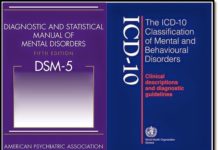Developing Alternatives to the DSM for Psychotherapists
A new article suggests counselors and psychotherapists are dissatisfied with current diagnostic systems and outlines some potential alternatives.
Climate Change Negatively Impacts Mental Health, Study Finds
Climate change-related extreme weather and increasing temperatures associated with higher rates of mental health challenges.
Polypharmacy Associated with Cognitive Decline in Elderly Patients
Study finds that elderly patients taking at least 5 medications were at increased risk of mild cognitive impairment and dementia.
United Nations Rep Brings Attention to Human Rights Violations in Psychiatry
Dr. Dainius Pūras argues that the status quo in mental health treatment is no longer acceptable and demands political action to promote human rights.
Better Outcomes Off Medication for Those Recovered from First-Episode Schizophrenia
A new study has found that of 10 people who were fully recovered from their first episode of schizophrenia (FES), those not taking antipsychotics did better in terms of cognitive, social, and role functioning—and reached full recovery more quickly.
Fake Science and Checking Sources
The field of psychiatry is awash with systematic reviews, meta-analyses and other published articles proclaiming various discoveries. But can this research be trusted? Let's examine one such article, "Suicide prevention strategies revisited: 10-year-old review," in which the author claims that the "anti-suicidal effects of clozapine and lithium have been substantiated."
Psychologists Advise How to Help and Minimize Harm Working With Migrants and Refugees
While well intentioned, providers and volunteers can do more harm than good at the border. The Global Psychosocial Network issues guidelines on how to work for the benefit of migrants and refugees.
Study Identifies Psychiatric Patients at Greatest Risk of Coercion
In an effort to reduce coercion, researchers isolate associated factors including age, relationship status, location, and diagnosis.
Flexible Treatment Planning Improves Depression Outcomes in Youth
Researchers explore the effects of augmented treatment at various points in interpersonal psychotherapy for adolescents diagnosed with depression, highlighting previously unidentified critical decision points (i.e., relatively early in the treatment sequence).
Prenatal Valproate Exposure Linked with ADHD Diagnosis in Children
Children who were exposed to anti-seizure drug valproate in utero were 48% more likely to develop ADHD, according to a new study.
Study Links Antidepressants and Decreased Coping Behaviors Across Generations
Biologists found that exposure to antidepressants suppresses important survival behaviors in zebrafish, an effect that persisted across three generations and was found to be more severe for males.
Can Cultural Engagement Protect Against Depression?
A new study examines the preventative effects of cultural engagement has on depression among older adults.
Individuals with Psychosis Symptoms More Likely to be Victimized
Individuals diagnosed with a psychotic disorder are 4-6 times more likely than the general population to experience victimization.
More Research Needed on Climate Change-Related Ecological Grief
Researchers outline the concept of ecologically driven grief due to climate change and recommend future research to better understand the psychological impact of climate change.
Tumbling Further Down the Rabbit Hole of Antidepressant Withdrawal Research
One of the criticisms of our systematic review was that it failed to include five randomised control trials. Here we will show how groundless this is, and thus gain insight into how shadowy and ethically suspect antidepressant withdrawal research can get when viewed up close.
What is Contributory Injustice in Psychiatry?
An article on contributory injustice describes the clinical and ethical imperative that clinicians listen to service users experiences.
Philosophers Challenge Psychiatry and its Search for Mechanisms of Disorder
Attempting to locate the mechanisms of psychiatric disorder is a step in the wrong direction and fails to challenge potentially unjust social practices.
How to Promote Community Inclusion in Mental Health Practice
Practitioners and public leaders identify methods and barriers for integrating those diagnosed with mental health issues into community life.
Researchers Push Back Against Recommendation to Combine Antidepressants for Suicide Prevention
Researchers challenge the recommendation of starting two antidepressants simultaneously to increase preventative effects against suicide.
Researchers Highlight Pitfalls of Cognitive Assessment in Schools
Historical, current, and potential future complexities of cognitive assessment; a longstanding, controversial fixture in schools throughout the United States.
Dementia Screening Tools Often Misdiagnose Patients
A new study has found that the three most commonly-used dementia screening measures often misdiagnose patients.
Researchers Recommend Diagnosing Social Adversity Rather than Individual Disorders
Already-existing ICD codes provide a diagnostic alternative to biomedical models of health by contextualizing suffering within psychosocial conditions, yet these codes are underutilized.
Why We’re Establishing an Institute for Scientific Freedom
Scientific freedom and integrity are constantly under attack, particularly in healthcare, which is dominated by the drug industry and other economic interests. To help preserve honesty and integrity in science, the new Institute for Scientific Freedom will open on March 9 with an international meeting in Copenhagen.
Researchers Call for Transparency About Limits of Psychiatric Knowledge
A new paper explores how the disputed nature of psychiatric knowledge influences public perceptions and debates within the field of mental health.
Collaboration with Consumers of Mental Health Services Improves Quality and Value of Research
A new study examines the benefits of collaborating with mental health consumers in research.

































